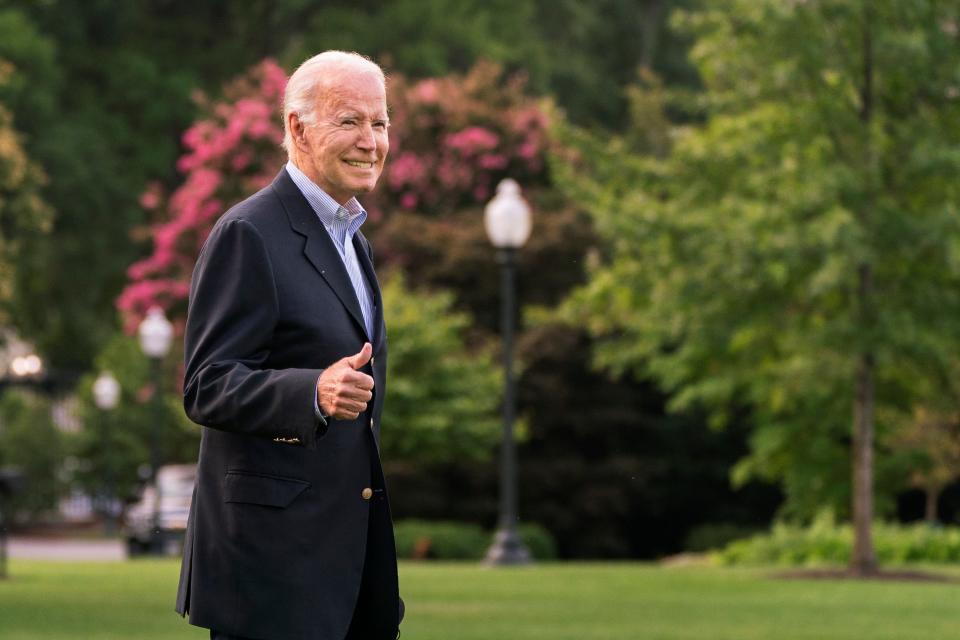‘Inflation reduction’ bill? Don’t buy Democrats’ fantastical twisting of reality.
I recently got to see my darling 5-year-old niece, and she and I have a tradition of reading and telling stories before bedtime.
She asked me to continue a story I had made up about a mermaid princess and her underwater friends. I can’t speak to my ability to spin a fairy tale, but I was successful in putting her to sleep.
I haven't been alone in dabbling in make believe.
Senate Democrats on Aug. 7 pushed through with a party-line vote the “Inflation Reduction Act,” which seeks to address climate change and prescription drug prices by … spending lots of money and growing government. The House passed the bill Friday, and President Joe Biden is expected to sign it this week.
“It’s the greatest example of deceptive marketing there is today,” says EJ Antoni, an economics research fellow at The Heritage Foundation, who defines inflation as “too much money chasing too few goods.”
It's all in the name
Wouldn't it be nice if simply slapping a hopeful name on a bill would translate into lower prices at the pump and grocery store? That seems to be what Democrats in Congress hope the American people will believe.
Unfortunately, the legislation is likely to do nothing to reduce inflation, which remains near a 40-year high. It could make it even worse.
10 Republicans voted to impeach Trump: Will any be left in Congress after November?
And it could harm an economy still recovering from the effects of the pandemic and government lockdowns.
The legislation claims it would reduce the deficit by levying a 15% minimum corporate tax and cracking down on those who don’t pay their taxes – measures that could hurt lower-income and middle-class families.

“Excessive printing of money and congressional spending bills helped create the inflation mess,” says Brian Riedl, senior fellow in budget, tax and economics at the Manhattan Institute. “And now, right on cue, Congress is going to try to spend our way out of an inflation mess.”
The bill purports to raise $739 billion in tax revenue over a decade, which would pay for the $433 billion in proposed spending, much of which is centered on the Democrats’ clean energy agenda.
Given how dependent our economy is on coal and other fossil fuels, a sudden shift could drive up costs.
Riedl says if the point is to move people out of fossil fuels and “into renewables before renewables are fully ready, ultimately that can result in higher costs for consumers.”
Secretary-general of the U.N.: 5 steps to help us kick our fossil fuel addiction and save the planet
With midterm elections growing closer and polls continuing to show dissatisfaction with Biden's handling of the economy, Democrats are eager to show they're doing something.

"I ran for President promising to make government work for working families again, and that is what this bill does – period," Biden said in a White House statement.
'Minimal impact on inflation'
Americans seem skeptical. A poll from ABC News/Ipsos released Aug. 7 shows that 69% of Americans believe the economy is getting worse. Only 29% say Biden is properly addressing inflation.
Hard times ahead: How Biden and the Fed are driving America into a recession
Even the Senate’s resident socialist, Bernie Sanders of Vermont, spoke skeptically of the bill’s actual impact.
"The so-called Inflation Reduction Act ... and I say so-called by the way, because according to the CBO (Congressional Budget Office) and other economic organizations that have studied this bill, it will, in fact, have a minimal impact on inflation," Sanders said.
Hold on to your wallets
Hiking taxes on businesses means they will compensate by cutting wages, raising prices or limiting future investments. And allowing the government to negotiate cheaper Medicare drug prices will translate into higher prices for other consumers.
“The president has pledged no new taxes on those making less than $400,000,” Riedl says. “These families may not directly send a higher tax bill to Washington, but they will endure lower wages, higher prices and lower stock values. With the economy at least teetering on the edge of recession, it is a terrible time to saddle businesses with even higher taxes and costs.”
And dumping $80 billion over 10 years on the IRS to weed out any “cheaters” means an additional 87,000 bureaucrats would comb through financial records of a much wider swath of Americans – not just wealthy ones as Democrats have posited.
Even the IRS chief from the Obama days has warned that the agency may not be able to use that amount of money “efficiently.”
The reality is this spending bill is not about efficient allocation of resources, nor will it combat the inflation that concerns so many Americans. The bill is all about giving Democrats some policy “wins” regardless of the economic costs. Don’t let them get away with tales to the contrary.
More from Ingrid Jacques:
►Democrats so badly want Trump to go away, but FBI's Mar-a-Lago search is helping him stay
►2022 elections could be a new year of the woman. Can conservative women catch up?
►Democrats should hang their heads in shame for helping oust a principled Republican
Ingrid Jacques is a columnist at USA TODAY. Contact her at ijacques@usatoday.com or on Twitter: @Ingrid_Jacques
You can read diverse opinions from our Board of Contributors and other writers on the Opinion front page, on Twitter @usatodayopinion and in our daily Opinion newsletter. To respond to a column, submit a comment to letters@usatoday.com.
This article originally appeared on USA TODAY: Biden's plan to slow inflation: Raise taxes and spend more. Seriously.

